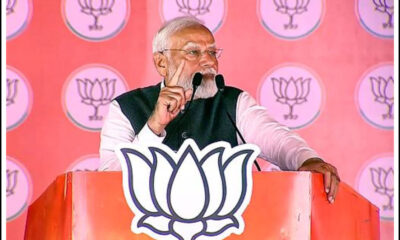ACTOR
Kay Kay Menon Delivers A Consciously Low-Voltage Performance in Love-All
Published
9 months agoon

Review of Love-All: Kay Kay Menon exhibits effective underplaying by letting badminton take precedence over his character
A plot ends the promising badminton career of a young player with promise. He abandons the game he adores out of rage and bitterness. Sudhanshu Sharma’s sports drama Love-All opens with the passing of one dream before turning the camera, as one might assume, to the birth of another.
There are 20 years between the two dreams. The man is relocated to the Bhopal railway colony where he first learned the game after making a pledge never to play again. He is accompanied by his wife, his school-age son (who serves as the protagonist of the movie’s central conflict) and a luggage holding an old badminton racket.
Love-All doesn’t stray from a tried-and-true story structure, despite what would at first glance appear to be a small variation on a drama about the triumph of the underdog. A child wanders into badminton without his father’s knowledge because participating in sports is required at his new school.
He picks up the sport like a fish to water, but in order to advance on the badminton court, he must overcome a number of challenges, chief among them being his father’s disheartening lack of enthusiasm for sports in general.
In the lead role of Love-All, Kay Kay Menon gives a purposefully low-voltage performance as Siddharth Sharma, the mature, crusty version of a bright youngster who was kicked out of badminton by a powerful clique and made to accept a miserable job in the railroads.
Twenty years later, his son Aaditya (Ark Jain), is encouraged to play sports by his mother Jaya (Shriswara Dubey), the schoolteacher Soma (Swastika Mukherjee), the other half of a failed love triangle from the past, and an old friend of his father’s named Vijendra (Sumit Arora), who runs a store selling sporting goods.
Love-All features a number of actual badminton players in prominent film roles. Their presence gives the sporting action the movie stages, which serves an otherwise simple story about a young prodigy’s difficulties in the face of overwhelming hardship, more reality.
The plot follows a formulaic path while emphasising the blood, sweat, and tears it takes to achieve brilliance in any sport. It also frequently repeats clichés about life and aspirations. Most sports films open with the hero in serious trouble and conclude with a stunning recovery. The same applies to Love-All.
A middle-class child competes against a haughty adversary from a wealthy family named Shourya (Kabir Verma), who has the support of Jay Pratap Singh (Raja Bundela), the leader of the neighbourhood badminton association.
Grandfather Shourya is the mandarin. Additionally, he is the badminton official who ended the career of Siddharth Sharma (portrayed by Deep Rambhiya as a young lad). What ultimately transpires over the course of the next 90 minutes or so is a story about a wounded man making amends by staunchly supporting his kid.
To love everyone is as simple as that. Does it suffice? Maybe not. When Siddharth arrives back in Bhopal, the man next door, Pandeyji (Atul Shrivastava), remarks casually that he is relieved and delighted that his new neighbour is also a Brahmin. Siddharth does not respond to the observation at the moment it is made or at any other time. Does he support Pandeyji’s petty thinking?
Love-All neither dispels this uncertainty nor makes any attempt to delve into the nation’s social divides. Yes, there is a man named Ansari (Robin Das) in this place, posing as the affable and helpful steward of the former badminton court that a young Siddharth had free access to after school.
Read also:-G20 Dinner Invite: “President Of Bharat” Creates a Lot of Buzz
When Aaditya wins a vital point in a scene towards the end of the movie, Pandeyji, the caste-conscious railway worker, hugs Ansari in the audience. Without any particular emphasis being spent on it, the image flashes by. Love-All never explicitly addresses the ability of sports to bring people together. That represents a lost opportunity.
At another time, Siddharth’s ex-girlfriend says that sports have the power to elevate people. She asserts that participating in sports makes you a better person overall. But Siddharth contradicts that statement given the type of sourpuss he is. He does, undoubtedly, have a change of heart just in time to advance the plot.
Love-All has a second half that is around 20 minutes longer than the first. Aaditya, a wild card, and No. 1 seed Shourya compete in a series of matches during the extra time in an attempt to advance to the finals of a sub-junior national event.
The games’ accompanying commentary is more annoying than beneficial. One is left to wonder if there is any chance that the writers of Indian sports films can ever come up with a plot mechanism that would eliminate the necessity for the clichéd, invasive, and crude talk that passes for description of the activity taking place on screen.
Thankfully, the dynamics of the sport we witness on screen never run the risk of sounding phoney since the kids in the movie are real shuttlers. The focus on badminton is always there in the movie, which is one of its main strengths.
A fabricated crisis is engineered in a sequence that sets up the climax, detracting from the’realism’ of the other scenes on the court and in the stands. However, it sets off a clash that puts the politician on the defensive and exposes the narrow-minded, self-serving strategies used by guys of his kind to maintain control over the sport’s resources.
In this country, where politicians refuse to release their vice-like hold on money-rich associations, almost every major sport is plagued by the painful truth that politicians won’t let go of their vice-like grip, as seen by the courtside slanging match between an arrogant minister and a sincere badminton fan.
In an example of effective underplaying, Kay Kay Menon lets badminton take precedence over his role, which he plays without using overtly dramatic techniques.
By no means are the two female actors, Swastika Mukherjee and Shriswara Dubey, rendered insignificant; rather, because Love-All is primarily focused on sports, they must be willing to watch the action from the sidelines, so to speak.
In Love-All, badminton is the undisputed champion. The movie itself could have scored a few more points to demonstrate its undoubtedly sincere efforts.
Cast:
Kay Kay Menon, Shriswara, Swastika Mukherjee and Atul Shrivastav
Director:
Sudhanshu Sharma
Credent TV Editorial Team

You may like
-


On the Citizenship Amendment Act (CAA), PM Narendra Modi challenges Congress and the SP
-


Shortly After Slovak PM’s Assassination, As Crowd Held Gunman
-


Vladimir Putin, the leader of Russia, makes a state visit to China as a symbol of the alliances’ solidarity
-


NASA: Bright, tiny, plant-like creatures discovered in the Celtic Sea
-


Earth’s North Pole is moving more quickly
-


Following the helium leak, Starliner is now aiming for a May 21 launch.
